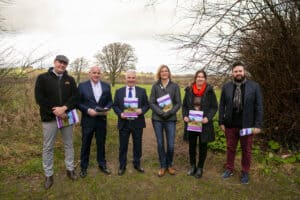Minister Hackett launches new MSc in Organic & Biological Agriculture
- February 7, 2022
- Posted by: admin
- Category: News
National Organic Training Skillnet have partnered with Waterford IT to develop and fund the new Level 9 Masters of Science in Organic and Biological Agriculture, which will have its first full intake in September 2022.
Minister Pippa Hackett was present for the launch of the new programme, as Waterford Institute of Technology (WIT) announced the approval of a range of postgraduate courses in organic and biological agriculture. Minister Hackett said WIT is one of the largest providers of land sciences education in Ireland and already has undergraduate degrees in agriculture, agricultural science, food science, forestry, horticulture and land management.

“Farmers, advisors and policy-makers need an increased level of knowledge and understanding of soil health and organic farming, so I am delighted to see this Masters in Organic and Biological Agriculture becoming available,” she said. “I am sure the breadth of flexible study options will be very attractive and will help hugely in our drive towards developing organic agriculture here to levels experienced across Europe.”
The Government’s targets for organic farming are “sizeable,” according to the minister. At the moment 2{3adc6a1018460a6005a2385c2e21b7e2663bd93d2376baf481e02840920176ea} of our land is used for organic production and the aim is to increase that from 90,000 hectares to 350,000 hectares, or 7.5{3adc6a1018460a6005a2385c2e21b7e2663bd93d2376baf481e02840920176ea} of land. “It’s a big task but a very worthwhile one, as it is also an important step in helping us reach our commitments to climate action through a reduction in greenhouse gases, and improved biodiversity and water quality.”
Other courses developed at WIT include certificates in soil health and water management, crop management, livestock management, food health and nutrition, agroforestry and landscape biodiversity, project management and marketing, and research methods in biological agriculture.
Sean McGloin, Manager of NOTS, said they had identified an increased demand for, and interest in, “specific areas including soil biology and health, more integrated approaches to livestock management and the strategic use of agro-forestry to enhance on-farm biodiversity”.
“Through our engagement with farmers, growers and producers, , NOTS identified an increased demand for, and interest in, specific areas including soil biology and health, more integrated approaches to livestock management and the strategic use of agro-forestry to enhance on-farm biodiversity. In combination, all these areas lead to better climate resilience on Irish farms. Funded as part of the Skillnet Ireland Future Dynamics initiative, new programmes like this will help growers and producers to enhance their knowledge and skills.”
Dave Flynn, Executive Director, Skillnet Ireland, said: “Ensuring businesses have the green skills they need to embrace more sustainable practices is a key priority for Skillnet Ireland. We are delighted to support NOTS and WIT on the development of the M.Sc. in Organic and Biological Agriculture which will deliver a pipeline of skilled graduates over the coming years, enabling our vital agriculture sector to continue to adapt and thrive and accelerating the growth of Ireland’s bioeconomy.”
The programme leader is John Geraghty who said the new courses are suited to farmers not already implementing organic or biological agriculture on the ground. “The skills and knowledge will help conventional farmers change methods and practices. That’s where the real change will happen. “It will give a scientific foundation to implementing practical changes farmers on the ground can use to deliver productive and profitable crop and livestock production. “Many farmers are looking to transition to low input systems.
“As well as the climate imperative there are very practical reasons such as cost reduction for farmers to upskill in organic and biological agriculture practices.”
